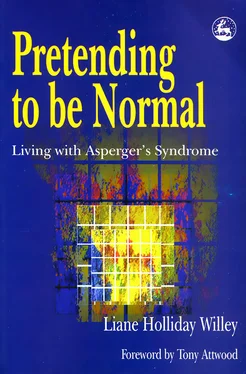Liane Holliday Willey - Pretending to be Normal
Здесь есть возможность читать онлайн «Liane Holliday Willey - Pretending to be Normal» весь текст электронной книги совершенно бесплатно (целиком полную версию без сокращений). В некоторых случаях можно слушать аудио, скачать через торрент в формате fb2 и присутствует краткое содержание. Город: London, Год выпуска: 2000, ISBN: 2000, Издательство: Jessika Kingsley Publishers, Жанр: Психология, Биографии и Мемуары, на английском языке. Описание произведения, (предисловие) а так же отзывы посетителей доступны на портале библиотеки ЛибКат.
- Название:Pretending to be Normal
- Автор:
- Издательство:Jessika Kingsley Publishers
- Жанр:
- Год:2000
- Город:London
- ISBN:1 85302 577 1
- Рейтинг книги:4 / 5. Голосов: 1
-
Избранное:Добавить в избранное
- Отзывы:
-
Ваша оценка:
- 80
- 1
- 2
- 3
- 4
- 5
Pretending to be Normal: краткое содержание, описание и аннотация
Предлагаем к чтению аннотацию, описание, краткое содержание или предисловие (зависит от того, что написал сам автор книги «Pretending to be Normal»). Если вы не нашли необходимую информацию о книге — напишите в комментариях, мы постараемся отыскать её.
Pretending to be Normal — читать онлайн бесплатно полную книгу (весь текст) целиком
Ниже представлен текст книги, разбитый по страницам. Система сохранения места последней прочитанной страницы, позволяет с удобством читать онлайн бесплатно книгу «Pretending to be Normal», без необходимости каждый раз заново искать на чём Вы остановились. Поставьте закладку, и сможете в любой момент перейти на страницу, на которой закончили чтение.
Интервал:
Закладка:
I worry a lot about the influence I have on my daughters’ self-esteem and their happiness. I do not want to fill their lives with anxiety or shame. My concern for them pulls me toward the mainstream even if I bruise along the way. I feel badly I do not encourage them to have many friends over, that I cannot help them with their math homework, that I have to cheat to help them with their spelling. I regret that small talk with the parents of my daughters’ friends is not easy for me. I am shamed when I do not know how to act. I do not like myself very much when I hear myself say, «Be quiet! Stop. Slow down. I can’t keep up. Please don’t talk to me all at once,» when my girls are only happily excited to share their day with me. And I hate it each time I realize my daughters have been my teacher more often that I have been theirs.
I know life with an Aspie mom can be very difficult on children. In my case, I can be extremely invasive and obsessive and blunt and loud. I routinely assault my children’s quiet and their reflections. I say the wrong thing at the worst time, tell too many stories with too many metaphors too loudly and too fast. I make the most unusual requests and remarks, take things too literally, obsess on the words and actions of others and typically, I am the one who never quite gets the point. I try to reinvent myself, but of course, this is taking time. I find I must settle for the apologies and then something more. I am learning to find ways that explain to them who I am in words they can understand.
Luckily, honesty and forthrightness come with the price of admission for Aspie people. We cannot help but tell people what we think the moment we think it. While this can cause great moments of awkwardness for those we speak to, it really can be a great blessing. I never, for instance, leave my children to wonder what I am thinking. I routinely vocalize my thought process, often to their dismay. Still — ours is a relationship always in the making, always changing and always growing.
I used to hope that I would be able to give my children my best side at all times. I wanted them to look to me as a role model they could rely on, as a mom who showed them which steps to avoid and which way to march. It was never my intention to rely on them as much as I do. Things are often skewed in our family, turned so that the mom ends up relying on the children for their judgement and guidance. I look to them as confidants and best friends. I ask them to help me find my way out of malls, to help me steer my way through a busy crowd, to hold my hand when my anxiety mounts, to tell me if I am saying things no one wants to hear. Amazingly, they never let me down. They take my requests in stride, no differently than if I had asked them to pick up their shoes or do the dishes.
I think the girls must consider me to be a work in progress. I am happy with that because there is so much to be learned from that perspective. If I can show them it is okay to make mistakes and that perfection is not a key to happiness, I will have given them self-acceptance. If I can teach them tenacity and courage in the face of confusion and doubt, I will have given them the will to achieve. If I can show them individuality and freedom of expression are prizes worth fighting for, I will have given them the chance to find themselves. And if, after growing up with me by their side, they learn the importance of acceptance and compassion, then I will have taught them tolerance. If all these things are to be part of who they are, then I will have been a good role model after all. I will have helped them to find goodness in all people and peace in themselves.
These days my family and I are on a well worn path that takes us toward mutual respect and sincere support. Sure we argue and fuss and say things we wish we had not, but then, there is nothing unusual about that. Our relationship with Asperger’s Syndrome has not made things between us any more difficult than they might otherwise have been. We allow AS to define us to an extent, but no more than our other genes do. We take it as a given that four of the five of us need glasses and all but one of us has dark hair. We take it as a given that Mom still has struggles with pieces of AS. We know there are many, many things we have yet to discover about each other, and many more things we will learn from each other. Along the way, we are learning not to make excuses about who we are, and we are learning not to wish we were, what we are not. We are learning how to be a tremendously supportive family and sometimes, that is all we need to know.
7
Settling In, But Never Down
On any given day, I can be just like everyone else seems to be. Until I remember I do not have to be. The me that I am has finally made friends with the differences I no longer try to hide. With effervescence in my heart I now find it easy, natural, right to harvest what I will and what I need from the places I visit and the people I meet. And with joy in my soul I am content to hope I have left something worthwhile, something safe and sound, behind me.
Before she was born, I knew my second twin was going to be a special child. She moved too much, she fussed too much, she never seemed to find calm or quiet like both her sisters had. Sure enough, her birth proved to be difficult. Try as I might, I could not deliver her. Her twin had been born effortlessly, but this baby would not budge. An ultrasound explained why — her birthing position was caught upside down and backwards. The doctors immediately set about the task of moving and manipulating my daughter this way and that, until after nearly twenty minutes, her position was changed to normal and I was able to deliver her without having to have a Cesarean section. I could not wait to see this baby, this child who had fought so hard not to be born. The doctor held her up for me to see, but only for a minuscule moment. «It’s a girl», was all I heard. A limp and lifeless baby was all I saw. Within seconds, the nurses took her away to a room I could not see. Everyone left tried to console my fears and abate my questions by showing me the healthy twin, the pink baby who was wailing and fidgeting and sucking her tiny, perfect fist. As happy and overjoyed as I was to see my little first born twin so healthy and strong, as wonderful as she felt in my arms, I could not swallow my fears. I kept asking what was wrong with the other baby, the one I had not met yet. The nurses assured me she just needed a little jump start, a little oxygen and tender loving care. The longest minutes in my life crawled by me until sometime later, how much later I have no recollection of, she was brought to me. Her coloring was not nearly as bright as her twin’s. Her movement was slow, her voice quiet. Though they were both nearly identical in their birth weights, this twin looked smaller, more frail, than her sister. My special child was beginning her life in a very special way and all I could do was hold her tight and tell her I loved her.
The doctors never alluded to the notion that she might have suffered any neurological problems, that her development might be delayed, that anything at all would drift from the norm. They never mentioned autistic spectrum disorder. They told us she would be fine. And so it was with much optimism that my husband and I began to raise this child just as we were her twin, just as we had their big sister. Yet there remained a voice in my heart that kept whispering something was different about this child, something… something. Six years later, the whisper became a shout and our world changed forever.
In comparing the twins, it was never obvious to anyone but me that there was any developmental difference between them. But it was tremendously obvious the two had very distinct personalities. Our oldest twin held our hearts with her quiet and cuddling and sweet shyness. Our youngest twin stole our hearts with her energy and her intense desires and her incorrigible tenacity. Life continued for us at a hectic pace as we struggled to enjoy every waking moment with each of our children, maintain two careers, a household, as much of a routine as we could muster, and as much peace and quiet as we could hope for. For the most part, the twins continued to baffle us as all children baffle their parents, and we tried to take every milestone and every missed beat in stride. It was not until the twins began preschool that I would begin to tell those who would listen, something was different about my youngest daughter.
Читать дальшеИнтервал:
Закладка:
Похожие книги на «Pretending to be Normal»
Представляем Вашему вниманию похожие книги на «Pretending to be Normal» списком для выбора. Мы отобрали схожую по названию и смыслу литературу в надежде предоставить читателям больше вариантов отыскать новые, интересные, ещё непрочитанные произведения.
Обсуждение, отзывы о книге «Pretending to be Normal» и просто собственные мнения читателей. Оставьте ваши комментарии, напишите, что Вы думаете о произведении, его смысле или главных героях. Укажите что конкретно понравилось, а что нет, и почему Вы так считаете.












